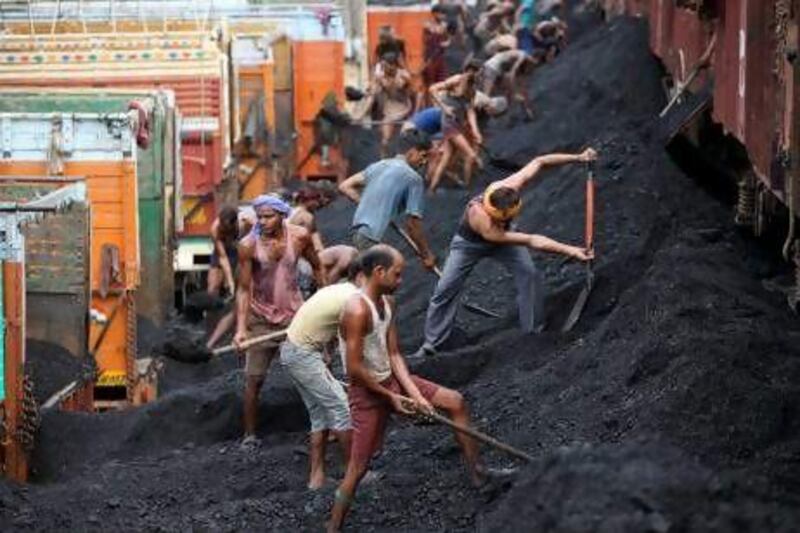NEW DELHI // The Congress party is scrambling to contain the crisis over fresh allegations of corruption after the opposition called for the premier to resign and blocked parliamentary proceedings for the third straight day.
India's auditor general has suggested, in a report published last Friday, that the government had lost out on 1.86 trillion rupees (Dh124 billion) of revenue by selling underpriced coal-mining rights.
Analysts claim that Prime Minister Manmohan Singh's response to the accusation has been unsatisfactory and, with the opposition Bharatiya Janata Party (BJP) on the attack, the Congress party's chairwoman, Sonia Gandhi, met party MPs yesterday to try to limit the damage.
The auditor general said that the government had erred by allocating coal-mining rights on a first-come-first-served basis rather than by a process of bidding.
It may have resulted in a lack of transparency, underpricing and possible kickbacks for officials, according to the report.
Prakash Javadekar, a spokesman for BJP, told the media on Wednesday that Mr Singh, who served as acting coal minister during part of the time under review, was "morally responsible" for the losses.
Over the last three days, the saga has paralysed parliament, with legislators trading accusations and refusing to engage in any new business.
Although Mr Singh's Congress party has expressed willingness to discuss the issue in parliament, the BJP has remained adamant that Mr Singh should resign.
On Wednesday and yesterday, leading BJP members staged a walkout of parliament, after raising slogans against Mr Singh.
The home minister, Sushilkumar Kumar Shinde, met BJP leader Sushma Swaraj in a bid to break the deadlock.
Earlier in the day, before parliament was adjourned, Mr Shinde had said: "The prime minister is ready to discuss the issue provided they [BJP] let the house function."
Pawan Kumar Bansal, the parliamentary affairs minister and a member of the Congress party, criticised the BJP because it was "in no mood for dialogue".
Mr Singh insisted that the auditor general's estimate of loss was "misleading" and that he can "give satisfactory answers to all issues being raised".
Paranjoy Guha Thakurta, a political analyst who has also made a five-part documentary on India's coal mines, called this "a rather weak argument".
Wary of being undermined by the saga, Mrs Gandhi and MPs discussed the issue.
An MP told the Times of India newspaper that Mrs Gandhi wanted Congress to expose the BJP's "obstructionist" parliamentary tactics, which had led to the adjournment of both houses of parliament yesterday.
The allegations by the auditor, which are being investigated by the Central Bureau of Investigation (CBI), involve collusion between government officials and private companies in allocating coal-mining rights across the country.
The coal ministry has responded to the audit report by claiming that it had followed an established procedure and that coal-mining allocations were not looked at as potential sources of revenue for the government "but with the intent to induce rapid development of infrastructure".
Before economic liberalisation, Mr Thakurta said yesterday, mining licences were handed out "behind closed doors, in a non-transparent manner".
"But 20 years after you have entered the brave new world of economic liberalisation, why continue with this flawed policy?"
Six months after Mr Singh first became prime minister in 2004, Mr Thakurta noted, he had suggested a process of competitive bidding for coal-mining rights. But that suggestion was discarded in the period under review by the auditor general.
"Just because you followed the previous due process, how does it explain your own recommendation, as prime minister, not being implemented?" Mr Thakurta said.
Dubbed "coalgate" by the Indian media, the scandal is the latest to beset Mr Singh's government since its re-election in 2009.
It is also strikingly similar to the 2G scandal, in which the former telecommunications minister, A Raja, was forced to resign in 2010 after he was accused of subverting the sale process of 2G mobile telephone networks.
An audit report of that sale estimated that Mr Raja had cost the government 1.76 trillion rupees in lost revenues.
Resources such as coal and mobile telephone network "belong to the people, and the government is supposed to act as a fair custodian", Mr Thakurta said.
"If it doesn't, you're bound to have allegations of crony capitalism, which is exactly what is happening."
[ ssubramanian@thenational.ae ]
Follow
The National
on
[ @TheNationalUAE ]
& Samanth Subramanian on
[ @Samanth_S ]
sbhattacharya@thenational.ae
Follow
The National
on
[ @TheNationalUAE ]
& Surya Bhattacharya on
[ @SuryatapaB ]
* With additional reporting by IANS





